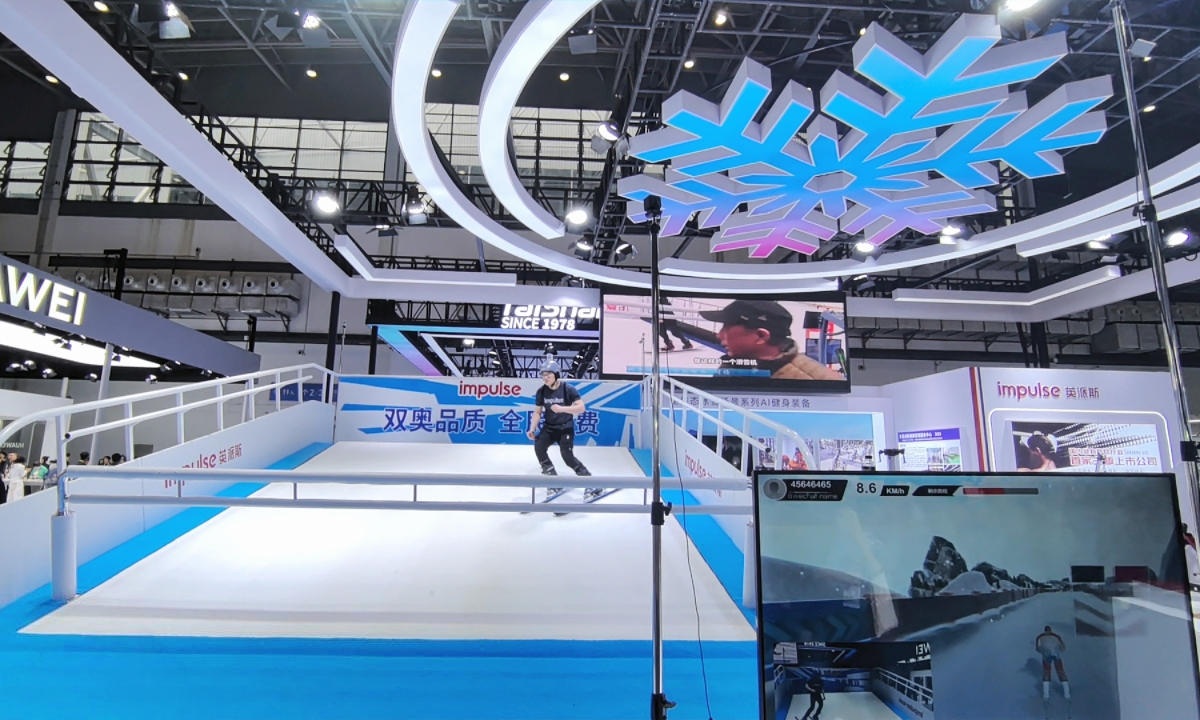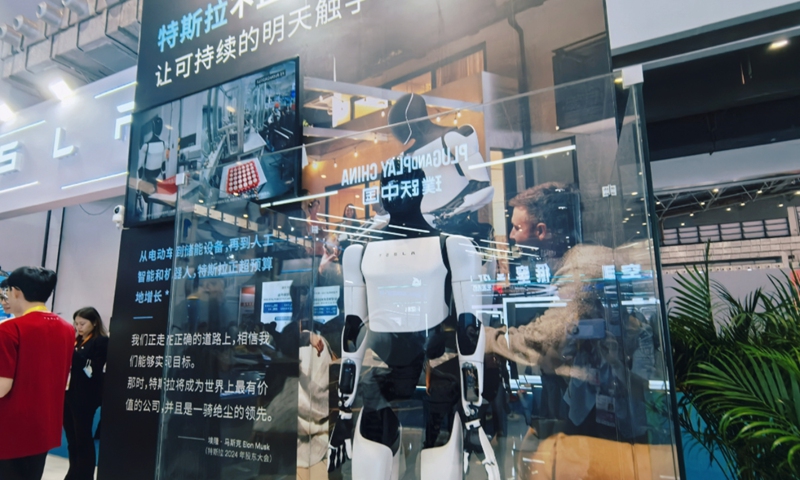
A staff member demonstrates the use of the digital ski simulator from Impulse (Qingdao) Health Tech Co at the 2025 China International Consumer Products Expo in Haikou, Hainan Province April 13, 2025. Photo: Zhang Yiyi/GT
At the 2025 China International Consumer Products Expo in Haikou, South China's Hainan Province, smart tech products are taking center stage. From artificial intelligence (AI)-powered massage chairs to humanoid robots, domestic and international companies are showcasing their latest innovations, highlighting the powerful fusion of technology and consumption and reinforcing China's growing influence in the global smart consumption ecosystem.
Health and AI integration is a major trend shaping consumer lifestyles. Singaporean brand OSIM presented its AI-powered custom massage chair, which uses AI to assess users' stress levels and automatically provide tailored massages. OSIM China's brand marketing vice manager Kathy Zhou told the Global Times that the company has been established in the Chinese market for more than 30 years, with more than 60 percent of its global stores in China.
"OSIM has placed particular focus on addressing sleep issues among Chinese consumers, combining AI technology with traditional Chinese massage techniques to help reduce stress and improve sleep quality, meeting the growing demand," she said.
In another exhibition area, an AI-powered digital ski simulator assesses users' skill levels and tailors exercise intensity. "Already used in sports and fitness training, it integrates AI, virtual reality and ergonomics to overcome the time and space limitations of traditional ice and snow sports," vice president of Impulse (Qingdao) Health Tech Co Huang Jian told the Global Times on Sunday.
As traditional fitness equipment fails to meet the growing demand for diversity, the intelligent model combines "smart hardware + digital services," creating a hybrid "training + entertainment" experience, he said.
Robots are increasingly transforming the services sector, with Keenon Robotics Co unveiling the XMAN-R1 in its global debut as a sales assistant, offering personalized product recommendations. Designed to engage with people, the robot performs heart gestures, nods its head, responds to voice commands with "OK," and offers a precise handshake.
"Our robots prioritize not only efficiency but also the warmth of human-robot interaction. Making robots more human-like in everyday settings has always been our goal," Chen Qian, marketing director of the company, told the Global Times on Sunday.
Building on this trend, Tesla is also making significant strides in humanoid robotics, aiming to scale production and transform industries with its advanced robotic technology. As a prominent player in international consumer technology, Tesla, marking its fifth appearance at the expo, plans to begin trial production of 5,000 units this year, with plans to scale up to 50,000 units next year.
A representative of Tesla told the Global Times on Sunday that using the same AI and vision technology as its vehicles, Tesla aims to make humanoid robots a major market force, with projections of billions of units globally.
"Our company plans to reduce production costs from hundreds of thousands to under $20,000 by leveraging its AI and manufacturing expertise. While mass production remains a challenge, Tesla is well-positioned to lead, lowering costs and creating new market opportunities," the representative added.

Tesla's humanoid robot is on display at the 2025 China International Consumer Products Expo in Haikou, Hainan Provine on April 13, 2025. Photo: Zhang Yiyi/GT
The exhibition has drawn admiration from both domestic and international visitors. "The development of robots in China is definitely a trend of the future. If I had enough money, I would buy a robotic dog for companionship and household chores," a resident of Haikou told the Global Times.
"I'm excited about the future, especially in China, where innovation is thriving. The advancements in robots and AI are impressive. China stands out for its fast technological progress, driven by strong policy support and public enthusiasm. While Europe tends to be more cautious with regulations, China's rapid pace is truly exciting to witness," Robert Michael Adolf, a visitor from Germany, told the Global Times on Sunday.
Zhang Yi, CEO of the iiMedia Research Institute, told the Global Times that the rapid adoption of technologies like AI and smart manufacturing is making "smart + consumption" a mainstream trend. At this year's expo, the focus is on systemic innovation, not just product strength. Chinese companies are using advanced supply chains and fast technology conversion to turn "tech experiences" into real consumer goods, reshaping global perceptions of Chinese manufacturing.
Zhang said that the technology-driven consumer market is evolving from awareness to practical use. Robot interactions in restaurants and malls are becoming more common, driving emotional and creative changes in the services industry. Additionally, improvements in transportation are enhancing safety, pricing and the overall experience, increasing consumer satisfaction.
He also noted that in Hainan, the blend of virtual and physical elements is shaping new consumption patterns. As a testing ground for new technologies, Hainan has enhanced its reputation. The use of health-related AI services and intelligent robots is reducing costs, boosting fragmented consumption, and driving demand, leading to innovation and new business models.





